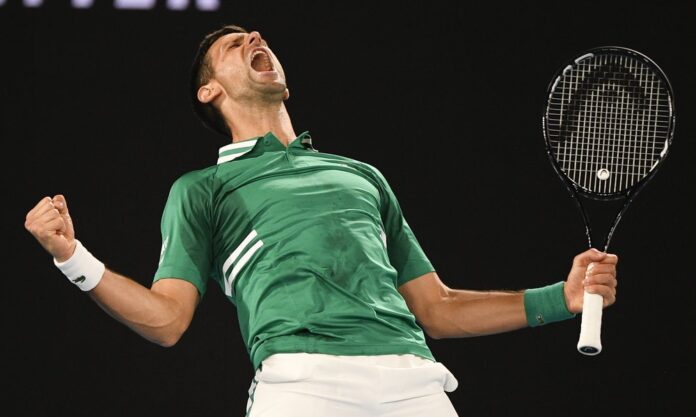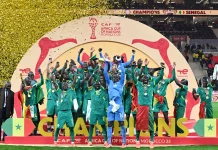
PARIS (AP) — It would be foolish to count Novak Djokovic out of any match, no matter how dire the circumstances or how steep the deficit. He’s shown that, over and over again, as recently as his last two wins at the French Open.
Similarly, it would be a mistake to write off Djokovic right now, after a torn meniscus in his right knee forced him to withdraw from the clay-court tournament where he was the defending champion — and where he was supposed to play in the quarterfinals on Wednesday.
And, ultimately, it would not make much sense at all to begin pondering whether this could presage the real and true end of seeing competitive tennis from any of the so-called Big Three, after Djokovic joined contemporaries and rivals Roger Federer and Rafael Nadal to claim title after title — 66 Grand Slam trophies combined — and spend week after week at No. 1 in the ATP rankings.
Year after year, folks wondered when it would unravel for all of them. Because, of course, it had to, either due to declining skills or accumulating injuries or, simply, age. Federer was the first to say goodbye, playing his last match at Wimbledon a month shy of age 40 in 2021 — a quarterfinal loss to Hubert Hurkacz — and marking his retirement 15 months later with a farewell match at the Laver Cup. Nadal, 38 as of Monday, dealt with hip and abdominal problems over the past 1 1/2 years, including surgery, and is currently sitting on the only clay-court losing streak of his entire career, with a setback at the Italian Open last month — to Hurkacz — followed by a first-round exit at Roland Garros last week. His future is unclear, although he sounded like someone who wants to try to keep competing.
As for Djokovic? First of all, it’s impossible to know exactly how long he will be sidelined after getting hurt during a fourth-round victory against No. 23 Francisco Cerundolo on Monday that lasted five sets spread across more than 4 1/2 hours. It was his second consecutive five-setter, with his total time on court across the two exceeding 9 hours, and he trailed 2-1 in sets on both occasions.
“I didn’t know, to be honest,” Djokovic said Monday night, “whether I should continue or not.”
Wimbledon, which he has won seven times, starts on July 1. The Summer Olympics, where he would love to finally collect a gold medal, starts its tennis matches on July 27 at Roland Garros.
Yes, he is 37. No, he hasn’t won a title all season; hasn’t even reached so much as one final. Yes, his unbeaten streak in Australian Open semifinals and finals ended with a loss in the final four to Jannik Sinner in January. No, he still has not decided on a permanent coach to replace Goran Ivanisevic. Yes, Djokovic will relinquish the No. 1 ranking as of next week, supplanted there by Sinner, a 22-year-old from Italy who still has a chance to win Roland Garros and get halfway to a calendar-year Grand Slam.
“Seeing Novak (withdraw) is, for everyone, disappointing,” Sinner said, “so I wish him a speedy recovery.”
This season represents as much of a dip for Djokovic as he’s had in quite some time, even if it did include a 370th Grand Slam match win, breaking a tie with Federer for the most ever. It might be Djokovic’s lowest on-court period since the stretch from mid-2016 to mid-2018, when he went 24 months without a major championship and needed an operation on his right elbow.
It’s instructive to recall what happened after that: Djokovic won Wimbledon in 2018, beginning a stretch in which he took home the trophy from 12 of 19 Grand Slam tournaments that he entered. That pushed his career count up to 24, the most in the sport’s professional era, which began in 1968 — two more than Nadal, four more than Federer.
Carlos Alcaraz, the 21-year-old with two majors who is primed, along with Sinner, to take over at the top of the game, noted Djokovic’s past history of returning from injuries: “He comes back stronger and he comes back quickly.”
This is what Djokovic said on the day he won that drought-ending, run-starting title at the All England Club six years ago: “There were several moments where I was frustrated and questioning whether I can get back (to the) desired level or not. But that makes this whole journey even more special for me.”
Given his oft-demonstrated resolve, it should not shock anyone to hear him echo that sentiment down the road.
___
Howard Fendrich has been the AP’s tennis writer since 2002. Find his stories at https://apnews.com/author/howard-fendrich and write to him at hfendrich@ap.org






